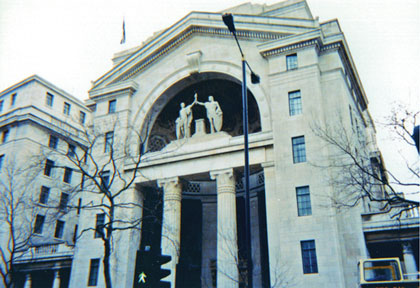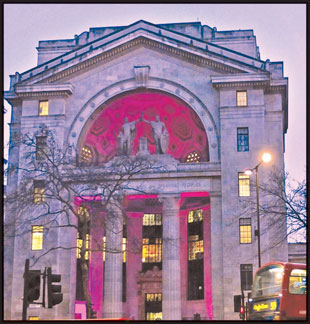Farewell, Bush House
by Faith Simpson Ratnayake
In 1959, I embarked on my first job, after leaving school at age 19.
Radio broadcasting then was firmly established, and my parents
subscribed to the Radio Times published by the BBC. Television was still
a novelty. My father purchased our first television set in 1952, a small
ten-inch screen Bush model, in a beautiful polished wooden cabinet,
especially to watch the coronation of Queen Elizabeth II.
 In the Radio Times was an advertisement for employment in the BBC.
After a short interview, I joined the new recruits, all females, on a
tour of Broadcasting House, given a reading test on the mic, and an
induction course in the various aspects of BBC work. This gigantic
organisation covered the high-profile radio broadcasting side,
nationally and internationally, and management, administration,
engineering and maintenance, catering, transport and other multifarious
tasks. In the Radio Times was an advertisement for employment in the BBC.
After a short interview, I joined the new recruits, all females, on a
tour of Broadcasting House, given a reading test on the mic, and an
induction course in the various aspects of BBC work. This gigantic
organisation covered the high-profile radio broadcasting side,
nationally and internationally, and management, administration,
engineering and maintenance, catering, transport and other multifarious
tasks.
My first assignment was in the production office of ‘The Week’s Good
Cause’, highlighting persons from various charitable organisations. Then
I was transferred to the engineering division. My boss covered
maintenance of the vast array of buildings and their equipment,
including the lifts, which the BBC owned or rented, including
Broadcasting House, Langham Place, many Victorian edifices and theatres.
I started learning the Japanese language, and a position opened at Bush
House, the hub of the Overseas Service.
Impressive
The imposing building was truly impressive, housing a multitude of
divisions and nationalities. The Japanese Program Section was on the 4th
floor, with the Far Eastern, South East Asian and East Asian Services,
and the Audience Research Section.
I worked there from 1960 to 1962. The exposure and experiences were
unique. I handled some program work, and correspondence from listeners,
who sent requests written in hiragana and katakana scripts. I was then
familiar with these syllabaries, and replied, and selected the music
they requested in the daily programs. One young woman made a request
which stays in my mind – for a song by Napkin Cole – better known as Nat
‘King’ Cole.
Our Japanese Program Organiser Trevor Leggett was a renowned Judo
master, and wrote several books on Eastern philosophies and religion.
Our Japanese staff then were David Iwama and Mrs Amy (Emiko) Arab, both
settled in England, Nakamura, Otohiko Otani of Tokyo Broadcasting System
and other seconded staff. They translated news bulletins and prepared
and presented individual programs, ranging from Music Album to Topical
Events and Actualities.
Many distinguished Japanese visitors came and gave interesting
interviews. One visitor who became a cherished friend – with whom I have
sadly lost touch – was Tony Toshiyuki Hagiwara, a journalist who lived
in America.
 He did a program on the move towards South East Asian studies in the
North British Universities. I was interested in furthering my studies,
and was applied and took up a post in the newly established Japanese
Studies Centre in the University of Sheffield. This meant my leaving
home to live in Sheffield. I always remember the beauty of this
industrial city, which was then the steel manufacturing centre, now
sadly gone. The countryside was magnificent. He did a program on the move towards South East Asian studies in the
North British Universities. I was interested in furthering my studies,
and was applied and took up a post in the newly established Japanese
Studies Centre in the University of Sheffield. This meant my leaving
home to live in Sheffield. I always remember the beauty of this
industrial city, which was then the steel manufacturing centre, now
sadly gone. The countryside was magnificent.
At Bush House, I had met my future husband, Dr Hema Ratnayake, then
the voice behind the Sandesaya Program from 1960 to 1964. His immediate
predecessor was Prof Tennakoon Wimalananda, and H M Gunasekara from SLBC
took over from Hema, followed by Sunanda Mahendra. We married in 1965
and came to Sri Lanka in October 1966 to settle down permanently.
It was with deep nostalgia that I heard the news of the final
bulletin transmitted by BBC World Service on July 12, 2012, after 71
years. The early years seem so far gone. The programs went out from
studios with a studio manager, massive microphones, and other equipment,
a far cry from the sophisticated multi-media communications systems of
today.
The departing BBC Director-General Mark Thompson’s recorded voice
depicted Bush House as ‘this benign Tower of Babel’ and ‘a unique icon
of authority and trustworthiness in news to millions of listeners around
the globe’.
The old order has passed, and a new, streamlined and much reduced
27-language service ranging from Arabic to Vietnamese, is now housed in
Broadcasting House, in a vast floor of the upper regions, with the
different sections housed in glassed-in cubicles.
I did count it as a privilege to have served the organisation, even
in a minor role and for such a short time, and the Japanese Service
closed down in 1993. It was the start of a lifelong love affair with
Japan, which sadly I have never been able to visit or take up the offer
of a Japanese Government scholarship to live and study in that country.
But my loyalties lay in this small corner of South East Asia, where I
have lived and worked for 46 years, although in the field of human
development and not in broadcasting. I paid a visit to Bush House in
1977, my first trip back to my native land, but it is said that you can
never return. There is always sadness when a great influence in your
life changes or vanishes.
|


